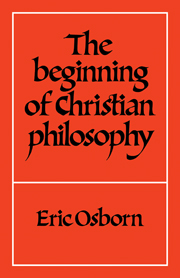
- Cited by 2
-
Cited byCrossref Citations
This Book has been cited by the following publications. This list is generated based on data provided by Crossref.
Osborn, Eric 2001. Irenaeus of Lyons.
Chistyakova, Olga and Chistyakov, Denis 2023. Theology of Greek-Byzantine Church Fathers as a Specific Way of Philosophical Thinking in an Epistemological Context. Religions, Vol. 14, Issue. 3, p. 355.
- Publisher:
- Cambridge University Press
- Online publication date:
- February 2010
- Print publication year:
- 1981
- Online ISBN:
- 9780511557507




